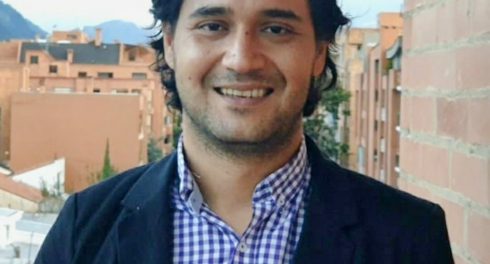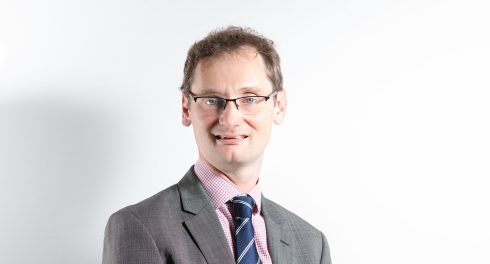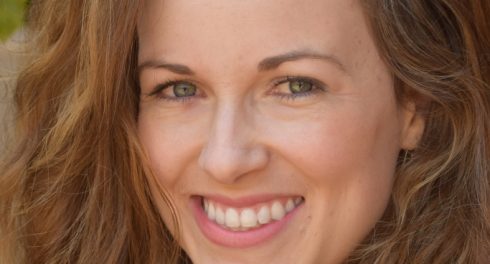Amina Salihu is a woman of many paths. She is a feminist, a farmer, a philanthropist, and a veteran in the Transparency, Civic Participation, and Accountability (TPA) field. She has been working on TPA issues for almost 30 years and currently serves as a Senior Program Manager at the MacArthur Foundation.
Before joining the Foundation, Amina served as Senior Special Assistant on Information and Strategy (2004 – 2007) to the Minister of the Federal Capital Territory (FCT) in Nigeria, where she designed and implemented accountability and communication initiatives. This included the FCT Town Hall Meeting and the Citizen Feedback helpline, shortlisted for the Bertelsmann Stiftung Reinhard Mohn Prize in 2011.
Amina is the civil society, grantee, and funder organization’s conscience in this episode.
- Welcome, Amina! Can you remember what first motivated you to work on transparency and accountability issues?
I think issues of transparency or participation and accountability have probably always been with me. Right from my secondary school days at the Federal Government Girls’ College, Bida, I was always fighting for the younger ones who were bullied by the seniors. I was the Assistant Food Prefect, and there were these big seniors who, after getting more than their share at the dining table, wanted more from that left for the juniors, but I would disagree. I don’t think those seniors liked me, but I really didn’t care.
At the university, being part of the Student Union movement was a natural trajectory. In ’89, my late friend Hassana Garba and I organized a protest against sexual violence and harassment on our campus. We had to run away after that because the authorities were after us. After we ran away, our mentors sent people to look for me. The person they sent to look out for me became the man that I married.
I have been working professionally in this field for almost 30 years. Right from my university days, I have been part of movements
So, some of us are just lucky to earn bread and butter from the things that matter to us, and which we need to do.
- What are the challenges you face working in the TPA field?
There are always challenges, but with challenges come opportunities. One key challenge I face every day as a woman doing this work is asking myself whether I am accountable enough to myself, and the values that I expect others to holdup. As a MacArthur Foundation grant maker officer, the Foundation demands that we do a full disclosure to avoid any conflict of interest. I am always asking myself, have I declared adequately? What are those other relationships that I may not remember, but I need to remember? How am I mindful of those relationships? For me, that’s the hardest part of doing this work.
Another challenge is ensuring that we are giving the right kind of advice to ensure that Foundation resources are used in the most effective value-for-money way. And it is not easy because you have to balance a lot of diversities. You need to be sure that the right kind of organization is getting the resource and that the results declared are impactful, sustainable, and shifting the needle towards accountability. You also want to lend support to organizations to be significant leaders in the field and be able to really catalyze transformative change in their work beyond only one grant. So, always asking oneself: “What more can you do”? “How else can you work?” “Who else in the space are you not mindful of?”
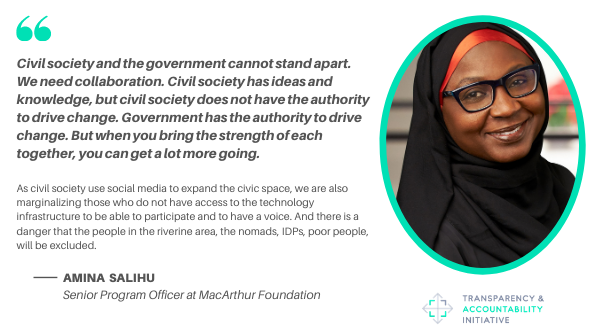
- What are the changes you have seen so far – especially in Nigeria, where you have been working?
In the last 30 years, I have realized that there is an increasing understanding of the need to bring gender equity and social inclusion to analysis. That understanding of the way power needs to be conceptualized and re-applied as well as the need to understand who has power and who is powerless and to be able to factor that into development work, government planning, and civil society agitation.
I am part of a process of crafting the next development plan for Nigeria. One of the things we’re asking is, “where is the gender equity and social inclusion analysis?” I don’t think that would have happened in the 1990s.
The second learning is the recognition that for transformative and sustainable change to happen, civil society and the government cannot stand apart. We need collaboration. Civil society has ideas and knowledge, but civil society does not have the authority to drive change. Government has the authority to drive change, but capacity is not always given. But when you bring the strength of each together, you can get a lot more going. The MacArthur Foundation has used this effectively well in our On Nigeria program. We need teeth (regulatory agencies)_ and voice (civil society ) actors to work together to enhance each other’s strength.
Thirdly is the role of technology and the fact that technology if used in a credible way, can shift the outcome of things. Take the Nigeria election in 2015 as an example and the role of social media being a civic tech platform and how the citizens were able to organize, for the first time in the history of Nigeria, to unseat a sitting president.
The fourth change, which I think we should be mindful of, is still linked to the civic technology opportunity and how civic space itself is evolving. It’s a lot easier to reach many more people because you don’t have to worry about the budget to call a big meeting or fix a date. Everybody is their own newsmaker –they can make the news, and they can process the news. But doing that also shows the lack of close attention to digital justice. As civil society uses social media to expand the civic space, we are also marginalizing those who do not have access to the technology infrastructure to be able to participate and to have a voice. We are not asking those core questions about how we ensure that as we transit into this “better” world of technology, we are also thinking about who is left behind. After all, the entire Sustainable Development Goals is about leaving no one behind.
And I think the fifth (lesson) for me is how we have held the government more accountable. It’s not yet perfect, but because of the combination of the power of the possibility of civic tech, we have a civil society that is getting stronger and more able to resist. On the African continent now, I am sure you’re following the story in Mali and the fact that the ECOWAS got together to say, “You cannot have a military coup in the 21st century. It’s not possible.” So that strengthens the civic voice. But we are still not able to shift that mindset to be open to differences and be accommodating of each other. We tend to take the tools and opportunities to benefit our own small space, not thinking about how our own opportunity might be a disadvantage for other people. We have made so much progress, but how do we not leave others behind? How do we ensure that everyone has not only equal but equitable opportunities?
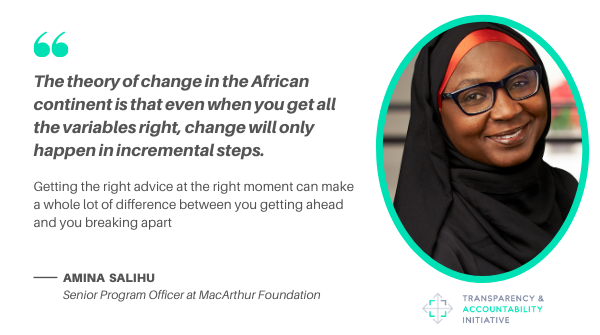
- What other changes will you like to see? What other areas will you want to see more done?
First, I will like us to recognize that the theory of change in our part of the world, on the African continent, is that even when you get all the variables right – you bring demand and supply together, you build capacity, you enable collaboration, you pay attention to the needs of the society and community generally — change will only happen in incremental steps. What that means is that we must be mindful of those small changes and guard them. So my key question to civil society is, even as we are trying to do more, how do we protect the gains we have achieved?
Second is trying to bring a sort of Johari window to the work that we do – where are other opportunities that we have not explored? As civil society, we have a responsibility to be a catalyst for change. The universal face mask is always my measure of that ability; with COVID-19 some people didn’t need to buy a facemask. they made masks, some improvised with their scarf or hijab. So human creativity came to the fore. We can bring in more creativity and make that connection between civil society and duty bearers.
Another is all of our large office structures, do we really need them? We should have those offices in communities so that they can be used as community town hall for meetings, training, and political gathering where you can also do your work. Some of us have such a huge office structure that you wonder, “what is this investment all about?” Co-location might help to keep the overhead down so that we can pay our staff better and look out for our staff more – and the condition of service under which our staff and colleagues work. We can’t be telling the government to do better, pay people better, and we are not looking out for our team.
Do we have a sexual harassment policy in our workplace? Do people understand the process of making complaints and seeking redress? Because for me, sexual harassment is corruption. The fact that somebody wears a certain dress or walks past you doesn’t give you the right to take what does not belong to you. My bodily right belongs to me. So, how are we creating safe places in our place of work? Some of us have not had this conversation, and I will like to see us doing this as a way to go forward.
We also need to know that when you fight corruption, corruption fights back. Everybody knows this, but we need to know how corruption fights back. Sometimes we understand how. Other times, we do not. We need to do an audit of the resource in our environment. We need to know which states are doing better to become our entry point because it is so easy to burnout. When you burn out, who will do the work of catalyzing change and supporting those who should lead change? So, identifying those spots where you have outliers and supporting them to do more is what I will like to see.
Finally, we should never be complacent when things are working well. We need to ask ourselves what else we can do better. I was just reading this morning about a new tool that colleagues are now using to force accountability. It’s called “cancelation culture.” For example, in Nigeria, you may have heard the story of Seyi and Dbanj on social media, where Seyi had accused Dbanj, a Nigerian musician, of raping her. We learned later that the police coerced Seyi and arrested her briefly and handed her over to the person she accused (Dbanj). I was shocked to hear that, but a lot of agitation on social media led to the Inspector General of Police to step in with the promise to investigate the matter – which should have been the case in the first instance. there was a call to the UN to cancel Dbanj’s endorsement. In other words, the respect that he had was called to question. That kind of thing is what I want us to continue to think about as a civil society. It is simple but so powerful.
- What recommendations will you give your younger self or anyone starting out as a program officer in this space?
Starting out, I wish I knew where to find support because this work can burn you out. You can be all alone. Sometimes, you can question your own sanity. “Why am I doing this?”
Second is also documenting all those amazing things I didn’t quite write about in those days. I have five to ten mentees every year assigned to me from some organization that I work with, and the first thing I do is to take them out to lunch and to get them a journal. I give them a journal because I have learned that you need to write to yourself. Certain things might get to you at 3 am when something prods you awake, or you are in the shower or something. Those kinds of aaha! moments, you need to write them down because you don’t know when you will need them later.
The third thing I would have told my younger self is not to make a promise I can’t keep. And I think now that I am older, I don’t make promises. I will say Insha’Allah –which means “Allah permitting” or Ceteris paribus in Latin, as economists will say.
- If you were to possess a superpower, what would it be and why?
If I had superpowers, it would be the power to give a second chance. I would give everyone I come across the chance to right the wrongs and mistakes they have made.
If I have my own superpower, it will be to say, “Okay, I take that back. Can we start all over again and get it right this time?” And imagine where Nigeria would be. Trillions of dollars wouldn’t have been stolen from this country. Our road system will work. Our children will be hale and healthy. We wouldn’t have malnutrition, Boko Haram, and conflict. We wouldn’t be where we are today.
